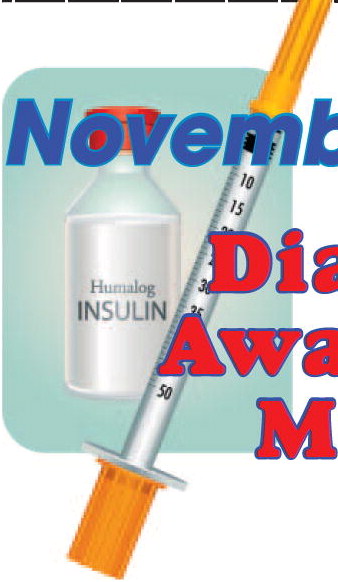November is …


Diabetes Awareness Month
How diabetes patients can prepare for COVID-19
Life during the COVID-19 pandemic has been challenging. Millions of people have lost their jobs, while millions more have been forced to accept reduced salaries. Coupled with those financial challenges, the public health crisis presented by COVID-19 has made 2020 a year many people would love to forget.
The COVID-19 virus has proven more challenging or stressful for some than others. At the dawn of the outbreak, the Centers for Disease Control and Prevention warned that people with certain underlying medical conditions are at increased risk of serious illness from COVID- 19. That includes people with type 2 diabetes.
The American Diabetes Association® urges people with diabetes to make a plan to confront COVID-19 before they feel any symptoms or are diagnosed with the virus. Such a plan can focus on gathering the supplies necessary should you be diagnosed with the virus or if restrictions on leaving your home are tightened as the weather cools down and people spend more time indoors, a situation that many researchers feel will lead to an uptick in COVID-19 cases. In addition, plans should include conversations with your health care team so you're in better position to overcome the virus should you be diagnosed.
Gathering supplies Make a list of important contacts.
Create a list of phone numbers of your doctors and healthcare team, including your pharmacy and your insurance provider. Keep the list on your refrigerator door or in another easily accessible place.
Make a list of medications and dos es, including vitamins and supplements.
Stock your pantry with simple carbs like regular soda, honey, jam, Jell-O, hard candies, or popsicles to help keep your blood sugar up or if you are too ill to eat.
Get extra rells of your prescrip tions. If a state of emergency is declared,
extra rells on your prescriptions can en sure you do not have to leave the house when it might not be safe to do so.
Look into having medications de livered. If you can't get to the pharmacy, inquire about having your medications delivered so you can limit your exposure
to the virus.
Restock your insulin. Always have
enough insulin available for the week ahead in case you get sick or cannot refill
your existing supply.
Recognize nancial help is avail able. If you are struggling to pay for insulin, the ADA has resources to help. Learn more about these resources at InsulinHelp.org Keep extra hygiene supplies on
hand. Stock up on rubbing alcohol and soap to wash your hands in the event it becomes unsafe for you to go out.
Anticipate glucose uctuations.
Make sure to stock up on glucagon and ketone strips so you can handle lows and highs.
Stock the pantry. Keep enough
groceries on hand so that you will be prepared to stay at home for a period of time. It's also wise to stock up on household cleaning supplies so you can keep your home clean even when you can't get out and about.
Diabetes patients are at increased risk of getting seriously ill from COVID- 19. As a result, patients must plan ahead in the event they become ill or if social distancing restrictions are tightened.
Meeks, Director of Development at RTCA. RTCA'S 1st Grade Class (pictured L-R): Front Row:
Rachel Salter, Annie Thompson, Claira Williamson, Tilly Baker, Easton Moore, Case Samples, Brantley Bailey, Dallas Montfort, Kennedy McIntyre, Back Row: Kinsley Thomas, Tatum Pittman, and Luke Hopkins.









